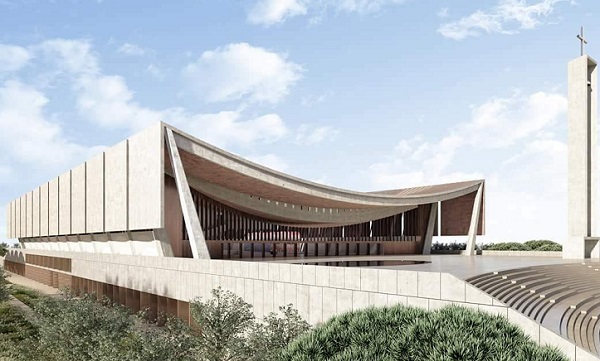By Alex Ababio
A confidential audit report by global accounting firm Deloitte & Touche has revealed that Ghana’s much-touted National Cathedral project has consumed over $97 million (GH¢339 million) of public funds as of December 2023—yet the project remains a stalled construction site with no substantial structure in place.
Commissioned under the leadership of President Nana Addo Dankwa Akufo-Addo, the project was envisioned as a monumental symbol of faith. However, the 76-page report—leaked to the public by government spokesperson Felix Kwakye Ofosu—paints a grim picture of financial mismanagement, procurement violations, and questionable expenditures that have raised serious questions about transparency and accountability at the highest levels of government.
Below are eight key findings from the Deloitte audit:
1. Payments Made Without Contracts
Deloitte discovered that the government disbursed GH¢15.7 million to the lead architect, Sir David Adjaye & Associates, before any official contract was signed in August 2019. Alarmingly, some payments were made even before the Public Procurement Authority (PPA) gave approval for single-source procurement.
2. Conflicting Payment Records
There were discrepancies totaling GH¢4.9 million between payment figures reported by the Office of the President and those acknowledged by Adjaye’s firm. In another instance, $861,000 in mobilization fees paid to consultants could not be accounted for.
3. Unauthorized Design Variations
A total of $12.4 million was spent on additional designs—including a 350-seater restaurant and a Bible Museum—without proper contractual agreements or PPA approval.
4. Dubious and Personal Expenditures
Deloitte flagged over $110,000 spent on fundraising activities in the U.S. which yielded no traceable donations. Another $24,498 went toward reimbursing personal items such as engraved mugs, pens, and even an Apple laptop for a consultant.
5. Missing Supporting Documents
Expenditures amounting to GH¢243,255 in 2023 lacked supporting documentation. These include payments for funerals, transport, and media engagements. Notably, GH¢117,180 was paid to the Board Secretary as rent—without any formal approval or documentation.
6. Procurement Law Violations
The report highlights illegalities in the single-source selection of Adjaye, which did not comply with Ghana’s Public Procurement Act. In addition, the project’s Procurement Committee was improperly constituted and lacked mandatory legal representation.
7. Deep Financial Mismanagement
Construction has been at a standstill since May 2022 due to funding shortfalls. Meanwhile, the project reportedly owes contractors GH¢343 million. Even more troubling, staff pension contributions were left unpaid in breach of the National Pensions Act.
8. Project’s Viability in Question
Deloitte concluded that the project faces “material uncertainty” over its future. With failed fundraising campaigns and exhausted government seed funds, the audit casts serious doubt on whether the project can continue.
Government’s and Management’s Responses Fall Short
The Board defended some of the questionable payments as “administrative decisions” and denied any wrongdoing. The Office of the President, however, did not respond to concerns regarding pre-contractual payments. Deloitte also noted that several issues remained unresolved due to inadequate responses from key stakeholders.
Conclusion: A National Project in Crisis
Intended as a sacred symbol of national unity and faith, the National Cathedral has instead become a symbol of broken processes and fiscal recklessness. With no clear funding plan, escalating debts, and unanswered questions, Ghanaian taxpayers are left wondering: Where did the money go?

